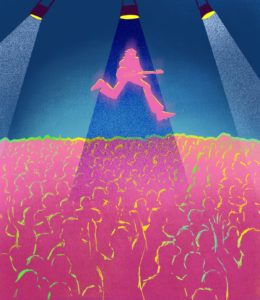This post was updated May 15 at 11 p.m.
The atmosphere shifts when someone hears that I’m majoring in English. Without fail, the next words to cascade from their lips are, “Why would you willingly choose to read so much for class?”
Their reasoning is that reading is not entertaining – at least not to the degree it was when our books had pictures. And reading is time consuming, they often purport.
The supposed death of media literacy, however, has taken the spotlight in current conversations.
Media literacy refers to the ability to think critically about any sort of media and to evaluate its message, unbarred by preconceived notions. It is a skill that is more important now than ever.
The seeds of media literacy are traditionally sown by teachers first and reaped outside of the classroom later on. However, a growing indifference toward exercising related skills – such as reading comprehension – clouds the analytical lens that allows us to intellectually interpret media in all its forms.
Louise Hornby, an associate professor of English at UCLA, said many social media algorithms oversimplify information.
“Less and less people are approaching media with a critical apparatus or some ability to look at context or some ability to think about circulation,” Hornby said. “I think people are losing or being taught to lose an ability to think critically about the media they’re receiving.”
Social media has an alluring, bite-sized appeal, requiring very little of our concentration as we consume it. But by conditioning its users to skim over content without a second thought, it has fostered the notion that media – visual and print – does not have to be mulled over to a greater extent.
“There’s a personal value to the act of analyzing,” said Alyssa Murray, a third-year English and psychology student. “It makes me feel like a more embedded citizen of the world, whether that’s news, or especially true when I consume art.”
Complex themes in media have existed since its inception, and humans are capable of dissecting them productively. In film and literature especially, intentional ambiguity offers an engaging diversion from the hard binaries of good and evil.
However, the decline of media literacy has made it more difficult to appreciate moral grayness. Ambiguous themes are vulnerable to being wildly misconstrued.
Separating the art from the artist, for instance, generates heated debates in conversations about media – if the content directly reflects the ideals held by the author or not and whether their personal views should be considered before consuming that media.
Hornby noted the example of Virginia Woolf, whose works have received scrutiny due to her mental illnesses rather than being read and evaluated based on their quality or merit.
“The piece that people have willingly forsaken, which is a sense of grayness. That characters are not constructed out of ‘either-or’ propositions but are often incredibly complicated, really contradictory and don’t necessarily do the things you want them to do,” Hornby said.
In fiction, the plot is enhanced by the inherent complexity of its characters. However, the author can also be considered a character themself, bearing personality traits that cannot so be easily placed into a binary.
An author’s choice to portray themes or representations that are essential to their characters occurs often, requiring a certain degree of analysis to parse through the message they wish to convey.
When the purpose of media is to portray the stories of people who have been historically undermined, changing political tides can heavily alter the way that audiences perceive it. A lack of media literacy tacked on to that furthers the chance of severe misinterpretation.
Priyanka John, a second-year communication and public affairs student, said people’s political and social commitments strongly dictate how objectively they view media.
“I think because people are so bombarded with this language of ‘wokeness’ and ‘progressiveness’ and how that’s negative and DEI and diversity, people forget it’s really just about including more stories in mainstream culture,” John said.
Media literacy is most functional when one can read or watch something without immediately jumping to conclusions. Unfortunately, that is not always the case – especially in online spaces that are cesspools for discussion.
False dilemma fallacies abound, where balanced critique is forgotten and there are only two polarized options, you must either like or dislike a piece of media.
“If you start sliding into extremes, that’s when you start putting blinders on, and you start seeing what you want to see,” said Westleigh Alder, a second-year English student.
Analysis and objectivity thrive when they are together.
To say media literacy has died would be quite outlandish. Rather, like a plant, it requires watering and care. It is just time we get back to cultivating its growth.






Comments are closed.